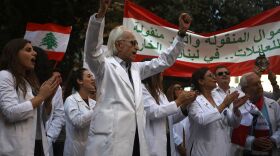
Deborah Amos
Deborah Amos covers the Middle East for NPR News. Her reports can be heard on NPR's award-winning Morning Edition, All Things Considered, and Weekend Edition.
In 2009, Amos won the Edward Weintal Prize for Diplomatic Reporting from Georgetown University and in 2010 was awarded the Edward R. Murrow Lifetime Achievement Award by Washington State University. Amos was part of a team of reporters who won a 2004 Alfred I. duPont-Columbia University Award for coverage of Iraq. A Nieman Fellow at Harvard University in 1991-1992, Amos returned to Harvard in 2010 as a Shorenstein Fellow at the Kennedy School.
In 2003, Amos returned to NPR after a decade in television news, including ABC's Nightline and World News Tonight, and the PBS programs NOW with Bill Moyers and Frontline.
When Amos first came to NPR in 1977, she worked first as a director and then a producer for Weekend All Things Considered until 1979. For the next six years, she worked on radio documentaries, which won her several significant honors. In 1982, Amos received the Prix Italia, the Ohio State Award, and a DuPont-Columbia Award for "Father Cares: The Last of Jonestown," and in 1984 she received a Robert F. Kennedy Journalism Award for "Refugees."
From 1985 until 1993, Amos spend most of her time at NPR reporting overseas, including as the London Bureau Chief and as an NPR foreign correspondent based in Amman, Jordan. During that time, Amos won several awards, including a duPont-Columbia Award and a Breakthru Award, and widespread recognition for her coverage of the Gulf War in 1991.
A member of the Council on Foreign Relations, Amos is also the author of Eclipse of the Sunnis: Power, Exile, and Upheaval in the Middle East (Public Affairs, 2010) and Lines in the Sand: Desert Storm and the Remaking of the Arab World (Simon and Schuster, 1992).
Amos is a Ferris Professor at Princeton, where she teaches journalism during the fall term.
Amos began her career after receiving a degree in broadcasting from the University of Florida at Gainesville.
-
"We are collecting from every person of goodwill," says a Roman Catholic priest who started a low-cost clinic. "We are not expecting a miracle. We hope to create a place where people feel respected."
-
An unprecedented legal battle against the regime is playing out in European courts, where large refugee communities and prosecutors can bring cases even for suspected crimes committed abroad.
-
In classrooms and at home, kids are reading a new genre of books about a timely topic: refugees. They're selling well and providing a sympathetic view of people often portrayed as threats.
-
Deborah Campbell's A Disappearance in Damascus is both a taut detective story and an intimate account of friendship during war — and that's before our reviewer discovered her own part in the story.
-
The conflict has created chronic mental pain in a country with few mental health specialists. Dr. Hussam Jefee-Bahloul, a Syrian psychiatrist who now lives in the U.S., has a plan to help.
-
Donald Trump has vowed to block new Syrian refugees and send current refugees back. A family of Syrian refugees in New Jersey and the volunteers supporting them are not sure what to expect.
-
Osama and Ghada and their four kids fled their homeland three years ago and recently reached the U.S. as part of the 11,000 Syrian refugees arriving this year. Every day brings new challenges.
-
Families paid tens of thousands of dollars for signs that a missing friend or relative was alive in Syria's vast prison system. But smuggled photos reveal many of those loved ones were already dead.
-
ISIS militants now control the long-running black market in stolen artifacts. Experts are tracking damage to heritage sites in Iraq and Syria by satellite and doing what little they can to stop it.
-
As the Iraqi army crumbled before militants this month, the nation's ethnic Kurds are taking back long-sought areas and revisiting the dream of declaring themselves an independent state.







